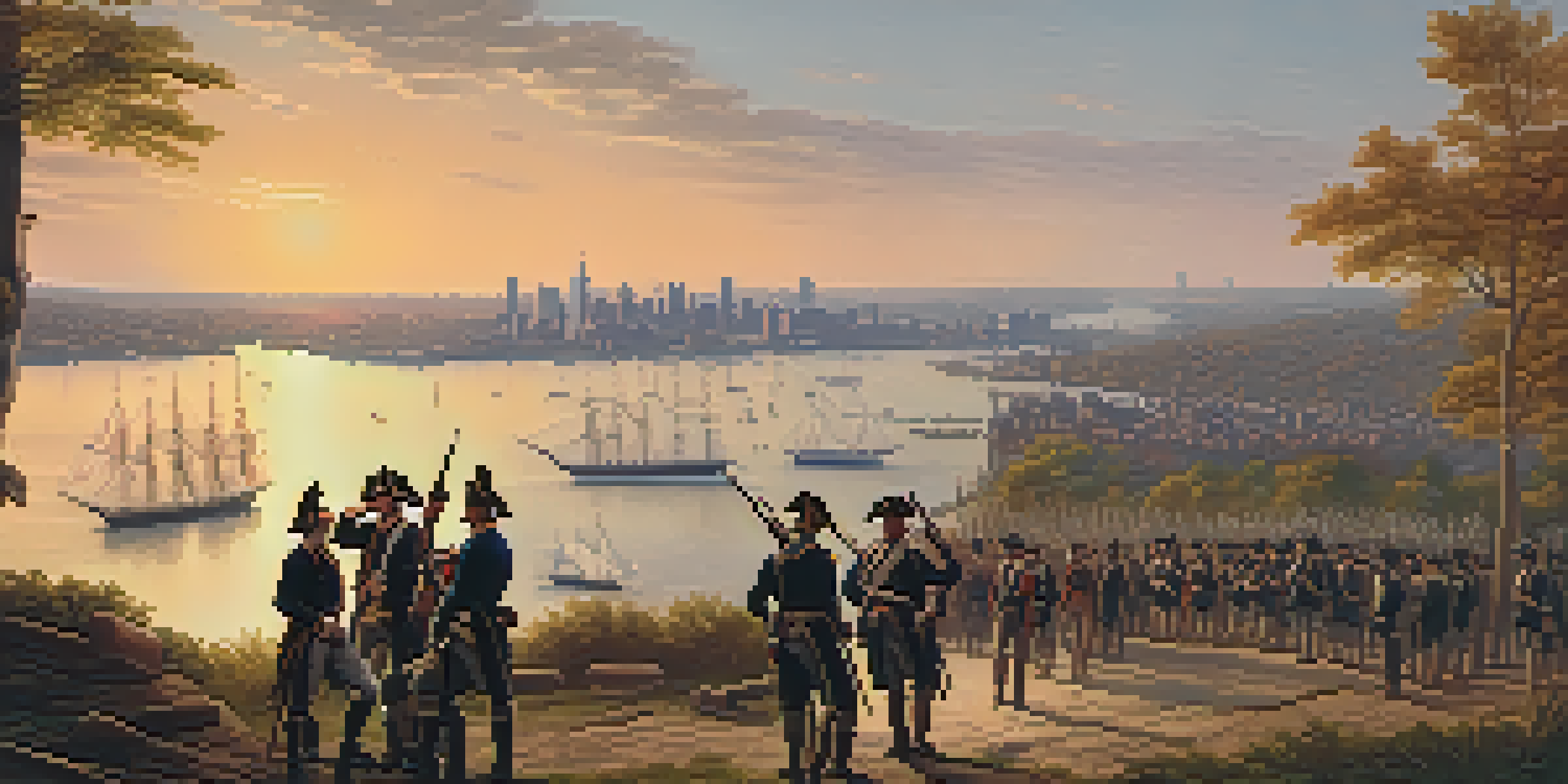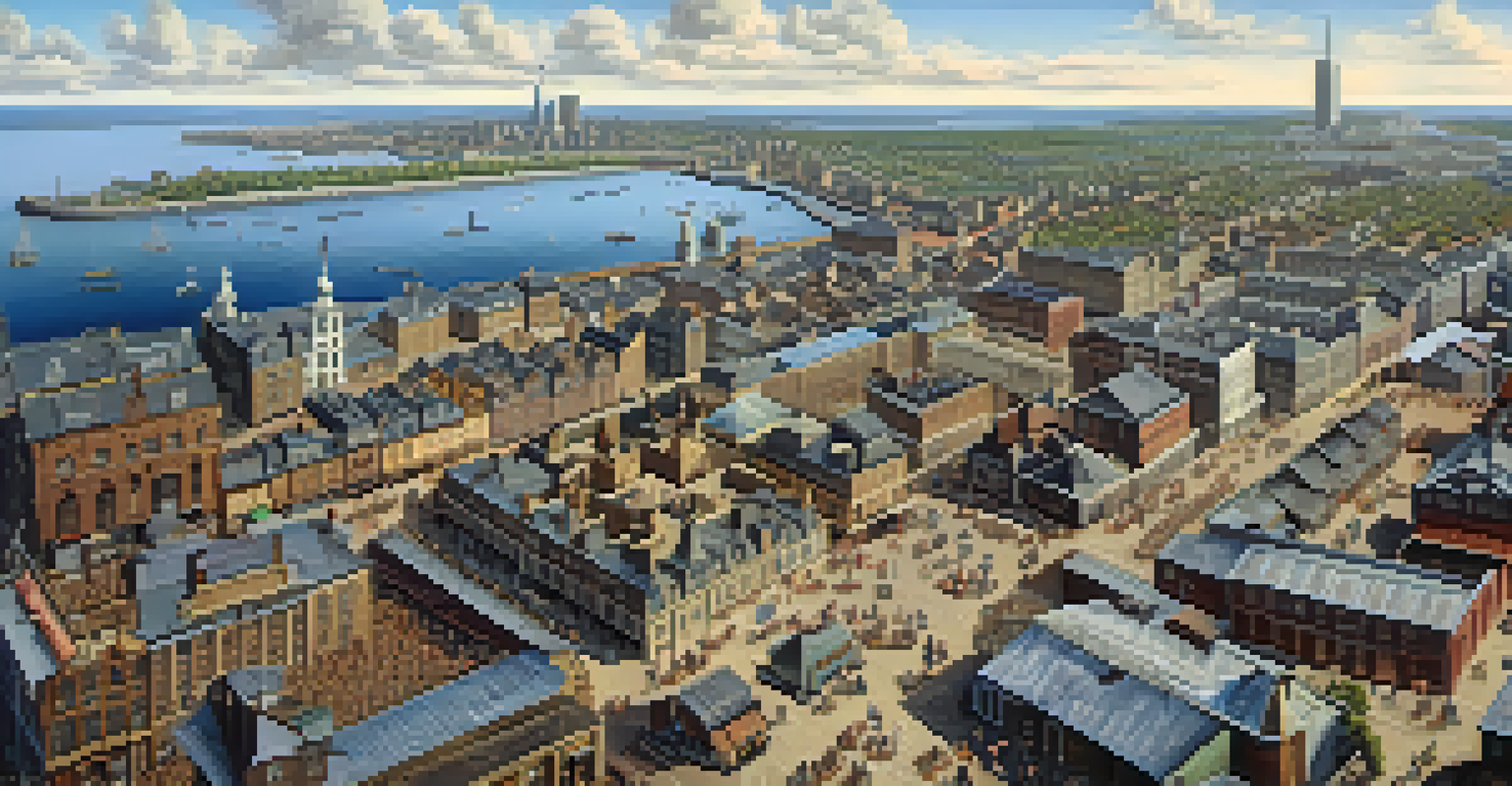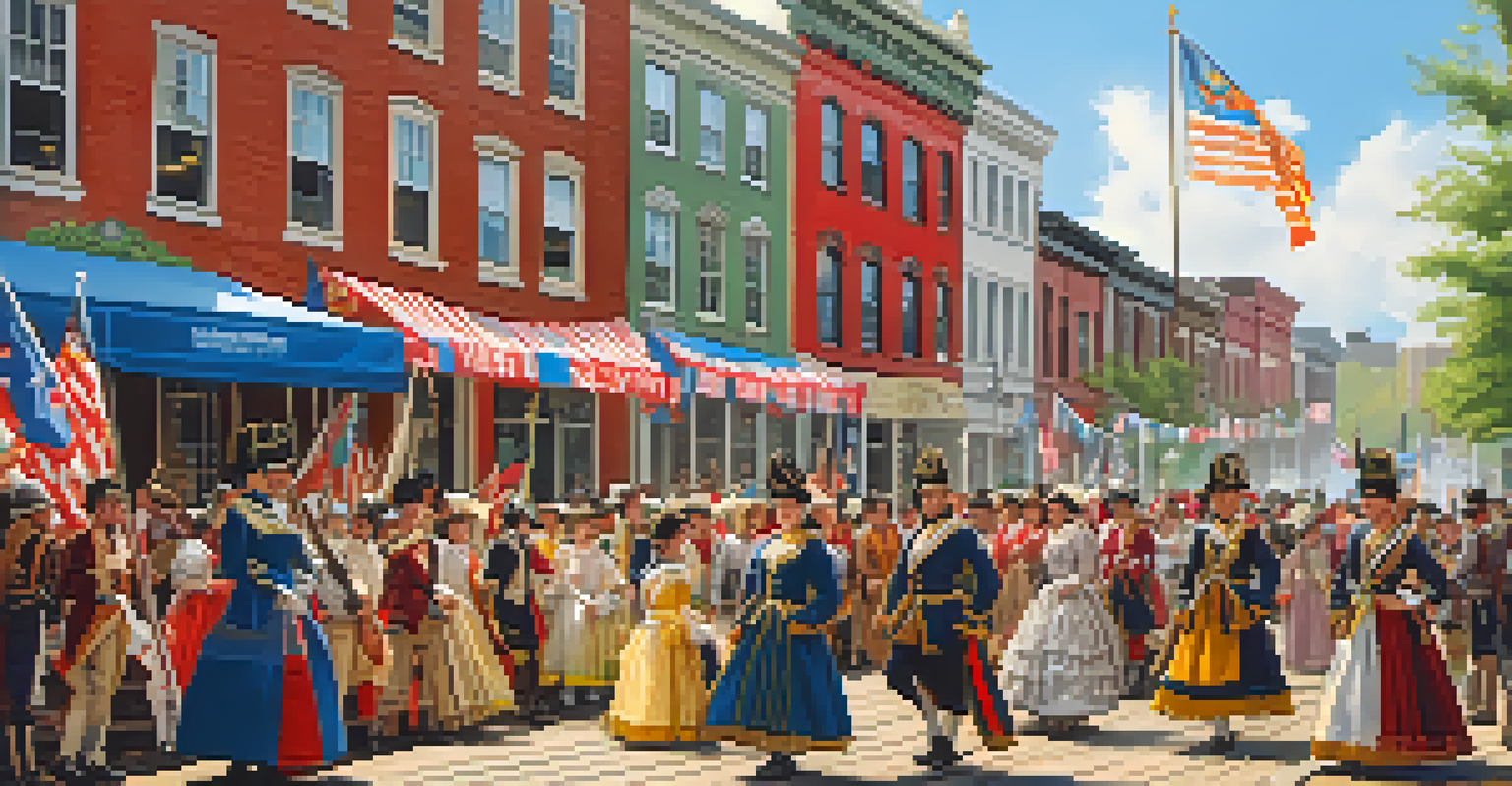Jersey City's Role in the American Revolutionary War History

Jersey City's Strategic Location During the War
Jersey City’s position along the Hudson River made it a vital point for military strategy during the Revolutionary War. Its proximity to New York City allowed both the British and American forces to utilize it for logistical support and troop movements. This geographical advantage meant that control over Jersey City often translated to control over New York, a key battleground.
The American Revolution was a beginning, not an end. The war was fought for freedom, and the legacy of that fight continues to inspire us today.
The rivers and terrain of Jersey City provided natural defense mechanisms, which were crucial for both sides. For instance, the marshy areas surrounding the city served as barriers against invading forces. This led to the construction of fortifications and lookout points that would become critical in various skirmishes throughout the war.
As the war progressed, Jersey City’s role evolved, reflecting the changing dynamics of the conflict. The city's strategic importance was not just about military might but also about its ability to serve as a refuge and supply line. This dual purpose would shape its involvement in significant campaigns and skirmishes.
Key Battles and Events in Jersey City
Jersey City was the site of several notable encounters during the war, including skirmishes that showcased the resilience of American forces. One of the most significant events was the Battle of Fort Lee in late 1776, where American troops defended against British advances. Although the Americans ultimately retreated, the battle highlighted the city's strategic importance.

Additionally, the area saw various movements and troop deployments, marking it as a staging ground for larger battles. The presence of local militia groups also added to the defense efforts, with residents participating actively in the fight for independence. This grassroots involvement provided a sense of community and shared purpose among the citizens.
Jersey City's Strategic Importance
Jersey City's location along the Hudson River made it a crucial military asset during the Revolutionary War for both British and American forces.
The impacts of these battles extended beyond military victories or losses; they forged a collective identity among Jersey City residents. The stories of bravery and sacrifice became woven into the fabric of local history, fostering a spirit of patriotism that would endure long after the war ended.
The Role of Local Militias in the War
Local militias played an essential role in Jersey City's defense during the Revolutionary War. These volunteer forces were often comprised of everyday citizens who took up arms to protect their homes and communities. Their commitment not only bolstered the American forces but also fostered a sense of unity and purpose among residents.
History is not a burden on the memory but an illumination of the soul.
The militias engaged in various skirmishes and provided critical intelligence to the Continental Army. They were often the first responders in conflicts, utilizing their knowledge of the local terrain to their advantage. This grassroots involvement was crucial in maintaining the momentum of the revolutionary cause.
Moreover, these local fighters formed a bond that transcended social and economic divides, uniting diverse groups under a common goal. The legacy of these militias can still be felt today, as they laid the groundwork for civic engagement and community activism in Jersey City.
Jersey City's Economic Contributions to the War Effort
Jersey City’s economy played a significant role in supporting the Revolutionary War. The city’s bustling trade routes and local resources made it an essential hub for supplying troops and funding the war effort. Local merchants and farmers contributed goods ranging from food and clothing to weapons and ammunition.
The economic activities also helped to sustain the morale of the soldiers and citizens alike. As resources were mobilized for the war, the local economy adapted, often prioritizing military needs over civilian consumption. This shift underscored the community’s commitment to the cause of independence.
Local Militias Shaped Defense Efforts
Local militias, composed of everyday citizens, played a vital role in defending Jersey City and fostering a sense of community unity during the war.
Additionally, the economic impact of the war shaped Jersey City’s future, marking a transition towards a more industrialized economy. The relationships built during this period laid the groundwork for post-war growth, ensuring that Jersey City would continue to thrive long after the last shots were fired.
Cultural Legacy of the Revolutionary War in Jersey City
The Revolutionary War left an indelible mark on Jersey City’s cultural landscape. The stories of heroism and sacrifice became part of the local narrative, celebrated through monuments, reenactments, and community events. This cultural legacy serves as a reminder of the city’s pivotal role in American history.
Local historians and enthusiasts work diligently to preserve these stories, ensuring that future generations understand the significance of their city’s past. Festivals and commemorative events often include discussions and activities that honor the contributions of local heroes, fostering a sense of pride in the community.
Moreover, the war's impact on the arts and literature in Jersey City cannot be overlooked. Many writers and artists drew inspiration from the events of the war, shaping the cultural identity of the city and contributing to a broader understanding of American history.
Jersey City's Post-War Transformation
Following the Revolutionary War, Jersey City underwent significant transformation as it began to rebuild and redefine itself. The end of the conflict ushered in a period of growth, as returning soldiers and new settlers sought to establish a prosperous community. The city’s strategic location continued to serve as a catalyst for economic development.
Infrastructure improvements were made, including roads and transportation systems, to facilitate trade and communication. This development not only enhanced the local economy but also attracted businesses and industries, laying the foundation for Jersey City’s future growth. The post-war era marked a shift from a focus on military strategy to a vision of prosperity and community-building.
Cultural Legacy of the War
The Revolutionary War left a lasting cultural impact on Jersey City, with stories of heroism and sacrifice celebrated through local events and historical preservation.
As Jersey City emerged from the shadows of war, its residents remained committed to the ideals of independence and democracy. The lessons learned during the conflict shaped the city’s governance and civic engagement, fostering a vibrant community that still reflects those revolutionary values today.
Modern Jersey City and Its Revolutionary Heritage
Today, Jersey City proudly showcases its Revolutionary heritage, with historical sites and museums dedicated to preserving its past. The city has made a concerted effort to honor the legacies of those who fought for independence, ensuring that the stories of sacrifice and bravery are not forgotten. This commitment to history enriches the community’s identity and attracts visitors interested in American history.
Local organizations often host events that celebrate the city’s rich history, including guided tours, reenactments, and educational programs. These initiatives not only engage residents but also invite a broader audience to explore the significance of Jersey City in the context of the Revolutionary War. Such activities foster a sense of community pride and historical awareness.

Moreover, Jersey City's ongoing relationship with its past serves as a reminder of the values that shaped the nation. As the city continues to grow and evolve, its revolutionary roots remain a source of inspiration, encouraging residents to engage with their history and contribute to the ongoing narrative of freedom and democracy.